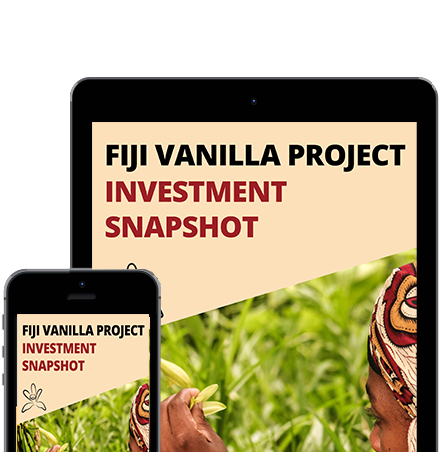New Fiji project addressing Vanilla Bean Scarcity
The vanilla bean industry in Fiji is about to enter a new phase using Australian expertise and backing to expand existing production at a time of an escalating world price that has made vanilla more expensive than silver.
The project is headed by Vanilla Plantations Fiji Pte Limited.
The vanilla industry in Fiji is based on small family run farms, as it is in Madagascar which produces 80-per cent of world supply, but with the world price at near record levels due to vanilla bean scarcity, room exists for major expansion of Fijian production without impacting on the world price.
The Managing Director of Vanilla Plantations, Mr Frederick Gulson, said vanilla is now the world’s second most expensive spice after saffron principally due to the world shortage of vanilla bean.
“The world market is experiencing significant and enduring vanilla bean scarcity, with annual global demand of at least 3500 tons far outstripping global production of around 2400 tons. The supply of vanilla bean is so under the level of demand that vanilla farmers in Madagascar, now referred to a ‘vanilliaires’, guard their crops at night against theft,” Mr Gulson pointed out.
Prices for vanilla beans, which are traded by individual contract and not on any public commodity exchange, have already surged over the past four years due to the perfect storm of rising demand as more consumers shun artificial flavourings and ingredients coupled with speculative hoarding.
The price climbed from about US$400 (Fiji $869/ AUS $579) at the start of 2016 to more than US$575 (Fiji $1249/ AUS $832) now due to the current vanilla bean scarcity caused by ‘Big Food’ companies adapting to consumer taste.
Mr Gulson said that under the Vanilla Plantations project investors in the Vanilla project will participate in this rising market while enjoying sound returns.
“The Government of Fiji will provide a number of investment, tax and revenue incentives for this agricultural project which will encourage expansion of the vanilla bean industry. There is a tax holiday available for the life of the vanilla project. An export income exemption deduction, currently set at 50%, has been provided for. An accredited capital deduction regime is available for qualifying capital investment,” Mr Gulson said.
“As a result of the shortages, Madagascar has introduced a vanilla bean licensing system, so only licensed growers and traders can legally possess vanilla beans. Theft of both vanilla beans and cuttings from farms are reported in all growing regions.”
The President of the Vanilla and Spice Committee of the Fijian Ministry of Agriculture, and himself a vanilla bean grower, George Hazelman, said that in the early 1900s Fiji was a large vanilla bean producer. Now, vanilla growers in Fiji are seriously addressing the worldwide scarcity of vanilla beans.
“Fiji’s vanilla bean industry warmly welcomes the participation of Vanilla Plantations Fiji Pte Ltd, with all its horticultural and marketing expertise. Not only will it generate jobs, but importantly for other growers, it will be an encouragement to adopt new techniques in vanilla bean cultivation at this time of opportunity,” Mr Hazelman said.
Market situation
The United States is the world’s largest consumer of vanilla, followed by Europe, notably France. This increasing demand has led to the world scarcity of vanilla beans.
Vanilla is not only used as a flavour in foods and beverages, but also in perfumes by producers such as Calvin Klein.
The dairy food industry uses a large percentage of the world’s vanilla in ice creams, yoghurt and other flavoured dairy products. The largest buyers are the “Big Food” companies such as Nestle, Danone, Mars, Hershey, McCormick and Unilever, the world’s largest ice cream maker.
“When the largest user of vanilla, Nestle, in 2011 announced a move from artificial vanilla flavouring to the real thing, industry competitors had to follow that lead,” Mr Gulson said.
Global food and beverage companies now enter into long term supply contracts with the Madagascan Commerce Ministry to ensure security of their vanilla supply due to the great scarcity.
Why is vanilla so expensive
In addition to the supply and demand equation that is due to the rising “all natural” food movement, there is increasing demand for pure vanilla plus regulatory regimes in the major consuming areas of the USA and Europe, plus regulatory regimes in producing countries.
Fiji suitability
Fiji has a competitive horticultural advantage that boasts a sound supply of surface water and aquifers, whilst the soil, climate and ‘terroir’ are ideal.
Employee loyalty is strong in Fiji with a very low turnover. Ninety-four percent of the population speak English and literacy is high and labour costs are very competitive. This is crucial as vanilla bean cultivation is the world’s most labour-intensive agricultural crop.
Vanilla Plantations expects to employ about 100 Fijians when vanilla vines reach full production three years after planting.
Furthermore, Fiji has a first world infrastructure as well as very stable political and financial environments that are ideal for addressing vanilla shortages.
Interested in learning how you can invest in the vanilla boom? Use the links below.
FIJI VANILLA PROJECT
INVESTMENT
SNAPSHOT


